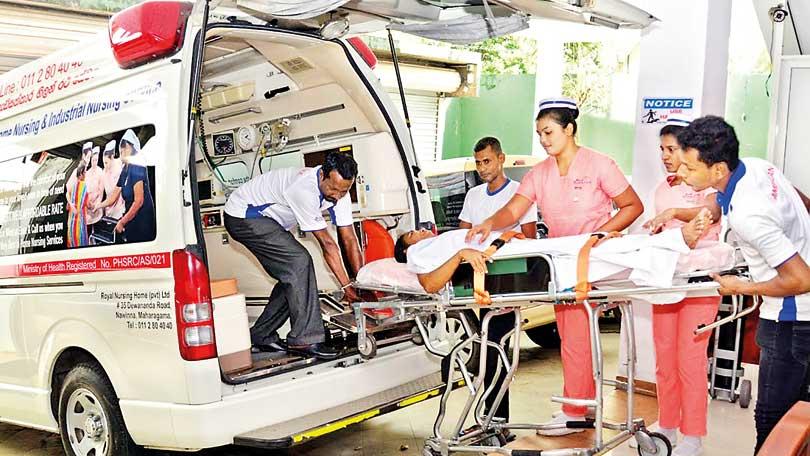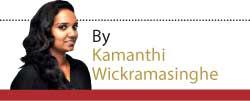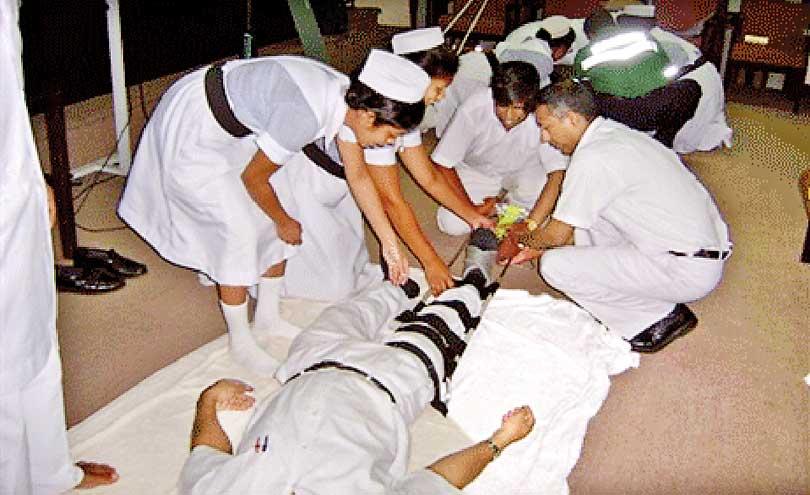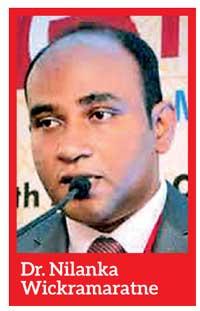21 Nov 2019 - {{hitsCtrl.values.hits}}

 Although Sri Lanka has shown progress in terms of primary care, maternal health and other indices, several areas still need to be improved. One of them is accident and emergency medical care. It is in fact identified as a demanding and complex area of practice, presenting diverse challenges with regard to patient-centred care. The basic emergency and trauma care in Sri Lanka was established with the introduction of the first ever Emergency Treatment Unit (ETU) at the Nuwara Eliya Base Hospital back in 1988 and this concept was followed by many other hospitals. With a well established and responsive emergency care service deaths and disabilities due to accidents and life-threatening emergencies could be minimised, in addition to premature deaths. In this backdrop, an accident and emergency care policy was drafted to improve quality of life of all citizens.
Although Sri Lanka has shown progress in terms of primary care, maternal health and other indices, several areas still need to be improved. One of them is accident and emergency medical care. It is in fact identified as a demanding and complex area of practice, presenting diverse challenges with regard to patient-centred care. The basic emergency and trauma care in Sri Lanka was established with the introduction of the first ever Emergency Treatment Unit (ETU) at the Nuwara Eliya Base Hospital back in 1988 and this concept was followed by many other hospitals. With a well established and responsive emergency care service deaths and disabilities due to accidents and life-threatening emergencies could be minimised, in addition to premature deaths. In this backdrop, an accident and emergency care policy was drafted to improve quality of life of all citizens.
Sri Lanka’s first batch of qualified emergency physicians is now working at different hospitals across the island, trying to save the lives of patients who require immediate medical care. Trained at the Postgraduate Institute of Medicine, they are then sent to Western countries such as Australia and UK to gain experience in the field. The primary task of an emergency physician is to manage the first four hours of a critically ill patient’s life.
Speaking to the DAILYMIRROR, Acting Emergency Physician at the National Hospital of Sri Lanka Dr. Nilanka Wickramaratne (MBBS, DCCM, MD – Emergency Medicine) shed light on the tasks vested upon an emergency physician and progress made in ETUs thus far.
“Triaging is where we sort the patients according to the severity of illness,” he explained. “After checking them we put them to Categories one through four. One is deemed as urgent. Urgent cases require immediate attention and are therefore sent to a resuscitation area in the emergency department. The first four hours of a patient’s life is quite critical. Therefore you need to decide what to do with the patient. They can either be admitted to a ward or discharged. For example, if a patient is having chest pain we need to get an ECG and treat him in the first 60-90 minutes. If there’s a clot in the heart then it needs to be dissolved. If there is any delay, the patient’s life would be at risk.”
The policy further states that the ‘platinum 10 minutes within the golden hour’ should be preserved in order to minimise untimely deaths, complications and long term disabilities
He further said that the accident and emergency department deals with patients undergoing trauma or have experienced medical or surgical emergencies. “The Karapitiya Hospital has one Accident and Emergency centre where as the Colombo National Hospital has no common triage centre. The Accident service and ETU at NHSL serves as separate units. According to the data that has been received 25-30% of cases are related to some sort of trauma while 65-70% of them are medical emergencies. These include heart attacks, breathing difficulties, strokes, pneumonia, infections etc. Fevers could also be critical from time to time,” he said.

According to the policy, pre hospital care service could also be a retrieval service which includes a fully trained team including medical experts attending to a patient on site or scoop and run with minimal intervention to the nearest hospital. The policy further states that the ‘platinum 10 minutes within the golden hour’ should be preserved in order to minimise untimely deaths, complications and long term disabilities. Therefore retrieval teams and paramedical teams would be established, based on the selected suitable pre hospital medical care model for Sri Lanka.
 Taking an example of a heart attack, Dr. Wickramaratne said that during a severe chest pain the golden rule is to do any intervention within 60 to 90 minutes. “In the near future we hope to provide the ambulance team with the facility to get an ECG and communicate with the relevant Emergency department. Each ambulance knows the particular hospital equipped with the required facilities to attend to this patient. Therefore, several interventions need to be done at the correct time. If the response time exceeds three hours, it will cause damage to the heart muscle. In the case of a Cardiac Arrest, 30% of patients will die on the spot, 30% will die in hospitals and 30% will survive. Our target is the 30% that need urgent medical care. One thing that needs to be done in the case of a Cardiac Arrest is chest compression and communities are being educated on cardiopulmonary resuscitation (CPR). This is also called bystander CPR which is quite an important intervention at the time of a Cardiac Arrest. During a Cardiac Arrest, the brain doesn’t get an adequate supply of oxygen and by compressing the chest there will be a minimal supply of blood that would provide some amount of oxygen to the brain. For this more than 100 compressions need to be done per minute. Then the patient should be taken to the nearest hospital. At this point retrieval medicine is very important. In future we are hoping to establish an ambulance service with trained paramedics.
Taking an example of a heart attack, Dr. Wickramaratne said that during a severe chest pain the golden rule is to do any intervention within 60 to 90 minutes. “In the near future we hope to provide the ambulance team with the facility to get an ECG and communicate with the relevant Emergency department. Each ambulance knows the particular hospital equipped with the required facilities to attend to this patient. Therefore, several interventions need to be done at the correct time. If the response time exceeds three hours, it will cause damage to the heart muscle. In the case of a Cardiac Arrest, 30% of patients will die on the spot, 30% will die in hospitals and 30% will survive. Our target is the 30% that need urgent medical care. One thing that needs to be done in the case of a Cardiac Arrest is chest compression and communities are being educated on cardiopulmonary resuscitation (CPR). This is also called bystander CPR which is quite an important intervention at the time of a Cardiac Arrest. During a Cardiac Arrest, the brain doesn’t get an adequate supply of oxygen and by compressing the chest there will be a minimal supply of blood that would provide some amount of oxygen to the brain. For this more than 100 compressions need to be done per minute. Then the patient should be taken to the nearest hospital. At this point retrieval medicine is very important. In future we are hoping to establish an ambulance service with trained paramedics.
If it’s not a life threatening case and the patient does not have the capacity we will take steps to talk with patient’s next of kin and to manage patient in the best interest of the patient
Dr. Wickramaratne opined that during an emergency one doesn’t need to get consent from the family members to admit a patient because everything is being done in the best interest of the patient. “Here we check the capacity and competency of the patient which is where we check if the patient is able to take a decision. If it’s not a life threatening case and the patient does not have the capacity we will take steps to talk with patient’s next of kin and to manage patient in the best interest of the patient.”
According to statistics at least 15 in 100,000 people die every year in Sri Lanka as a result of road accidents. Therefore, accident and emergency care is a much needed specialty of medicine given the rising number of such incidents being reported in the country. With paramedics being deployed, many lives could be saved during a patient’s journey to the hospital. But for this service to be efficient, an efficient ambulance service is required. On the other hand, by educating the communities, they would take initiative to save a person’s life till he reaches the hospital for further medical assistance.
18 Apr 2024 1 hours ago
18 Apr 2024 1 hours ago
18 Apr 2024 2 hours ago
18 Apr 2024 3 hours ago
18 Apr 2024 3 hours ago